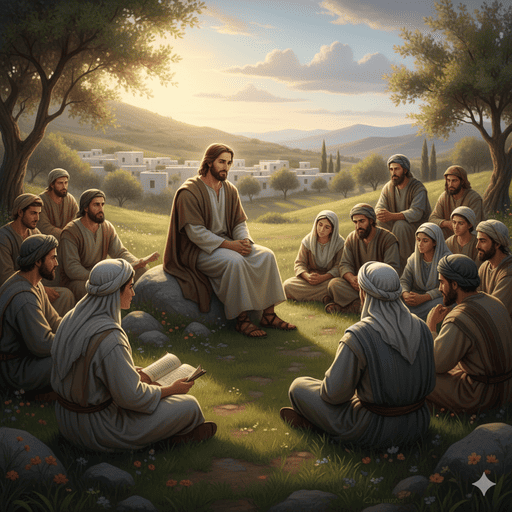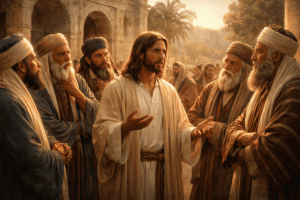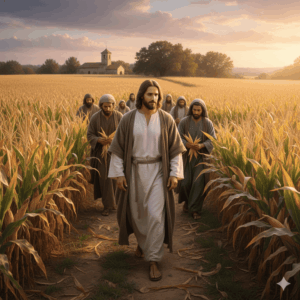According to the Bible, Jesus did not break the actual Sabbath law as God commanded in the Old Testament, but he often disregarded and challenged the additional, man-made restrictions developed by religious authorities such as the Pharisees.
By healing the sick and allowing his disciples to pick grain on the Sabbath, Jesus demonstrated that God’s purpose for the Sabbath was to bring rest, compassion, and blessing to people—not to enforce a set of burdensome human traditions.
His actions highlighted the true spirit of the Sabbath and redefined what it means to honor God’s law.
The Sabbath Law in Jewish Tradition
The Sabbath’s roots lie in the Torah, where the commandment “Remember the Sabbath day, to keep it holy” (Exodus 20:8) is accompanied by explicit instructions to abstain from work, just as God rested after creation. (Genesis 2:2-3)
However, the Torah leaves “work” (Hebrew: melacha) largely undefined.
Over centuries, rabbis built an elaborate framework to clarify what constitutes prohibited work, culminating in the Mishnah’s list of 39 melachot, or types of labor (including sowing, reaping, baking, carrying, healing, etc.).
In Jesus’ day, the Pharisees, along with the scribes and other religious authorities, were the recognized interpreters and enforcers of the Sabbath law.
Their focus on maintaining ritual purity and obedience to God’s commands led to detailed oral traditions which shaped daily life for observant Jews.
Gospel Accounts of Jesus’ Sabbath Actions
The Gospels document several incidents where Jesus’ actions, or those of his disciples, brought the charge of breaking the Sabbath. The most prominent cases are:
Picking Grain on the Sabbath
All three synoptic Gospels narrate an episode where Jesus’ disciples pluck heads of grain and eat them as they walk through the fields on the Sabbath (Matthew 12:1–8; Mark 2:23–28; Luke 6:1–5).
The Pharisees protest, asserting that such activity (plucking and rubbing grain) constitutes “reaping”—one of the 39 prohibited activities on the Sabbath.
Healing on the Sabbath
Multiple accounts describe Jesus healing on the Sabbath, which provokes criticism from religious leaders:
Man with a withered hand (Matthew 12:9–14; Mark 3:1–6; Luke 6:6–11): Jesus heals in the synagogue, after explicitly challenging their interpretation about what is lawful on the Sabbath.
Bent woman (Luke 13:10–17): Jesus heals a woman bent over for 18 years, prompting indignation from the synagogue ruler.
Man with dropsy (Luke 14:1–6): Jesus heals and asks if it is lawful to heal on the Sabbath.
Paralytic at Bethesda (John 5:1–18): Jesus heals and tells the man to carry his mat, violating Sabbath rules against carrying burdens.
Man born blind (John 9:1–16): Jesus makes mud to anoint the man’s eyes, an act seen as “work”.
Was Jesus Breaking the Sabbath Law?
Were Jesus’ actions truly violations of the Sabbath, or were they challenges to the prevailing interpretations of “work”?
Mosaic Law Versus Oral Tradition
Strictly speaking, the Torah itself does not define healing, plucking grain to eat, or helping the needy as “work.”
The conflict arises because the Pharisees applied their oral traditions—later codified in the Mishnah—to interpret the Torah’s commands.
From their perspective, Jesus’ actions fit the definition of “work” according to the accepted traditions. However, by older scriptural standards, the connection was far less clear.
Jesus’ Statements on the Sabbath
Jesus often redefined the purpose and spirit of the Sabbath. When challenged, he replied, “The Sabbath was made for man, not man for the Sabbath” (Mark 2:27).
He highlighted humanitarian needs, asking rhetorically: “Is it lawful to do good on the Sabbath, or to do evil, to save life or to kill?” (Mark 3:4).
His argument frequently appealed to scriptural precedents. For example, when his disciples were accused of “reaping,”
Jesus pointed out how David once ate the consecrated bread (which was also technically unlawful), highlighting that human need can supersede ritual laws.
Mercy and Intention Over Ritual
Rather than abolishing the Sabbath, Jesus emphasized its original intent: rest, worship, and compassion.
Acts of mercy, such as healing the sick or relieving hunger, fulfilled God’s purpose for the Sabbath.
In this perspective, Jesus was not so much breaking the law as restoring its core meaning.
Jewish Authorities’ Accusations and Legal Standing
Why the Pharisees Believed Jesus Broke Sabbath Laws
The Pharisees’ objection was grounded in protecting the sanctity of the Sabbath as defined by both scripture and their longstanding oral traditions.
For them, plucking grain equaled harvesting, healing was medical work, and carrying a mat was an impermissible burden—all serious infractions.
Distinction Between Biblical Command and Rabbinic Additions
Jesus’ approach underscored the difference between God’s direct commandments and the layers of rules built around them by human authorities.
By violating certain oral laws (but not clear biblical prohibitions), Jesus exposed the distinction between scripture and tradition—a point later picked up by the early church.
Was Jesus a Lawbreaker?
In summary, according to strict Pharisaic interpretation, Jesus and his disciples broke the Sabbath by performing activities that the rabbis identified as forbidden labor.
By Jesus’ own understanding, however—and arguably by a direct reading of the Torah—they did not violate God’s law, but rather the additional traditions that had accumulated over centuries.
Jesus as Lord of the Sabbath
A key claim in the Gospels is Jesus’ assertion that “the Son of Man is Lord even of the Sabbath” (Mark 2:28).
This radical statement places Jesus above the tradition, with the authority to define and interpret God’s law.
Christians believe this points to his divine authority and messianic identity.
Conclusion
In summary, Jesus was accused of breaking Sabbath laws because he and his disciples performed acts—plucking grain, healing, commanding a man to carry his mat—that were considered “work” by the religious authorities of his time.
According to the Pharisees and rabbinic tradition, these were genuine infractions.
However, from Jesus’ perspective, as well as according to a straightforward reading of the Scriptures, he did not break God’s law but challenged human traditions about it.
Jesus’ actions and teachings reoriented the Sabbath’s meaning, focusing on mercy, human need, and the true intent of God’s commands.
This not only set him at odds with religious authorities, but ultimately transformed how Christians understand law, mercy, and rest.
The controversy over “what Sabbath law did Jesus break” thus reveals not only a clash of religious interpretations, but also the heart of Jesus’ ministry—to bring God’s compassion, healing, and freedom to his people.
My Letter To A Sunday Keeper – Sabbath Documentary

The Days of Noah – Powerful Documentary (Video Format)

Bible Studies – Written Format







